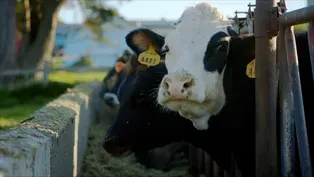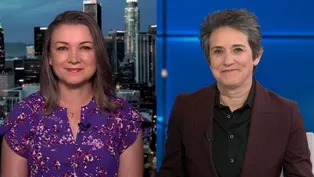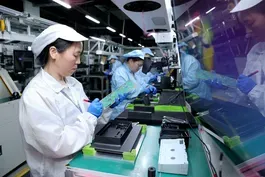
How Meta's antitrust trial could have major implications
Clip: 4/14/2025 | 6m 2sVideo has Closed Captions
How Meta's blockbuster antitrust trial could have major implications for big tech
A blockbuster antitrust trial between Meta and the Federal Trade Commission is underway. The government alleges the company monopolized the social media market when it purchased Instagram and WhatsApp. The trial could have major implications for big tech. Stephanie Sy discussed the case with Rebecca Allensworth, a law professor at Vanderbilt University.
Problems with Closed Captions? Closed Captioning Feedback
Problems with Closed Captions? Closed Captioning Feedback
Major corporate funding for the PBS News Hour is provided by BDO, BNSF, Consumer Cellular, American Cruise Lines, and Raymond James. Funding for the PBS NewsHour Weekend is provided by...

How Meta's antitrust trial could have major implications
Clip: 4/14/2025 | 6m 2sVideo has Closed Captions
A blockbuster antitrust trial between Meta and the Federal Trade Commission is underway. The government alleges the company monopolized the social media market when it purchased Instagram and WhatsApp. The trial could have major implications for big tech. Stephanie Sy discussed the case with Rebecca Allensworth, a law professor at Vanderbilt University.
Problems with Closed Captions? Closed Captioning Feedback
How to Watch PBS News Hour
PBS News Hour is available to stream on pbs.org and the free PBS App, available on iPhone, Apple TV, Android TV, Android smartphones, Amazon Fire TV, Amazon Fire Tablet, Roku, Samsung Smart TV, and Vizio.
Providing Support for PBS.org
Learn Moreabout PBS online sponsorshipWILLIAM BRANGHAM: A blockbuster antitrust trial# kicks off today between Meta and the Federal Trade## Commission.
The government alleges the company,# which was then called Facebook, monopolized the## social media market when it purchased competitors# Instagram in 2012 and WhatsApp two years later.
Stephanie Sy is here to explore the# potential impact of the trial -- Stephanie.
STEPHANIE SY: William, the trial, which# is expected to last up to two months,## could have major implications for big tech.
If the social media giant loses, it# could be forced to break itself apart## and sell off both of those popular# platforms, including Instagram,## which is projected to make up more than# half of the company's ad revenue this year.
To help us understand the issues, we're# joined now by Rebecca Allensworth,## professor of law at Vanderbilt University.
Rebecca, thanks so much for# joining the "News Hour."
This is a case that has been years in the making.# And we know what the major battle lines already## are.
The government alleges that Meta used a# strategy to buy or bury other start-ups, killing## competition.
Does the FTC have a strong case on# that basis, that Meta has violated antitrust law?
REBECCA ALLENSWORTH, Vanderbilt University# Law School: So, it has a strong case on that## part of the case, about whether or not# the acquisition suppressed competition.
The weakest part of its case is actually whether# or not Facebook is a monopoly in the first place,## whether or not Meta is a monopoly.# It has to prove both monopoly power## and an act of exclusion that allowed# it to maintain that monopoly power.
But the problem for the government# is that there are potentially other## competitors that we could see# as major players in this space.
STEPHANIE SY: Meta's lawyer today called the## case a grab bag that was -- quote --# "at war with the facts and the law."
We saw -- or we heard that Mark# Zuckerberg himself testified today.## What are the strongest points of the defense and# do they have to do with the fact that so much has## changed in the social media landscape since# this case was first brought four years ago?
REBECCA ALLENSWORTH: This is not a grab# bag.
This is definitely a strong case.
So,## on the part of the government,# it's a very strong case.
As far as what are Meta's best arguments,# those have to do with market power and market## definition.
But their weakest arguments, the# strength of the government's case really comes## from these e-mails that Mark Zuckerberg# wrote about the acquisitions at the time,## where he really kind of laid out what we would# call in antitrust like an anticompetitive intent.
STEPHANIE SY: Mark Zuckerberg wrote in that# 2008 e-mail: "It is better to buy than compete."
But I want to go back to this point about the# changing landscape.
Some critics of the FTC's## case point out that so many other competitors have# sprung up, namely TikTok, in the last four years.## Does the government have more of an uphill battle# just given how quickly the landscape has changed?
REBECCA ALLENSWORTH: You're right to point# out that the landscape has changed a bit.
But,## at the same time, I think that the# government has a strong argument that,## in fact, Facebook, Meta is still a# monopolist and they have monopoly power.
And that's because, while people do sometimes# consume other social media platforms, they do## spend time on other platforms, they look at ads# on other platforms, they still view Facebook,## Facebook Blue, the product we all associate# with Facebook, as not having substitutes.
It's really one of the only ways# to stay in touch with your friends## and family.
The real question is, can# Facebook make their product worse and## not lose customers?
And we know that# they have done that over the years.
STEPHANIE SY: This is one of several# antitrust cases against big tech that## started years ago under the first Trump# administration and then, of course,## continued under Biden.
And we# have spoken about the landmark## ruling last year which found Google was# monopolizing the Internet search sphere.
Rebecca, do you see momentum gaining to rein in## big tech with antitrust law?
Is this# the case to continue that momentum?
REBECCA ALLENSWORTH: I do see that momentum.# And it's not just these cases.
It comes from## some of the merger cases too, even# the ones that the government lost.
There were all kinds of theories# that were endorsed in those cases,## those little data points that courts are# ready to shift the momentum of antitrust## away from laissez-faire and start really# taking big companies to task for doing## things that are anticompetitive,# especially digital monopolies.
Now, the big one here obviously is the# verdict in the search case.
But I think## we're probably about to get another win# for the government on another Google case,## another monopolization case in the ad# tech case.
And I don't know exactly## how that will go, but I think there's# a good chance the government will win.
And I think, if the government wins# this third case, that's a real kind## of tidal wave of liability# for these digital platforms.
STEPHANIE SY: How much does the political# landscape in Trump 2.0 potentially impact## the outcome here?
We know that Mark Zuckerberg# has been lobbying hard for a settlement.
And,## of course, he was at President# Trump's inauguration this year.## It's been a bipartisan issue# largely at least until now.
Do you see that changing?
REBECCA ALLENSWORTH: It's impossible# to know what this means and how it## will matter.
It's just too unpredictable.
We# don't know what happened in those meetings.
I think what we know is that Trump views# the FTC as being under his control,## which is legally incorrect and not the# way the agency was designed.
And yet## he fired the two Democrats on the FTC in# a strong signal that this is my agency,## this is my policy.
We also know, of course,# that Mark Zuckerberg has cozied up to him## and trying to take advantage of that control# that Trump is trying to wield over the FTC.
But whether it's in it -- whether there's# something in it for Trump to actually do this,## whether he actually will interfere on behalf# of Mark Zuckerberg and Meta more generally,## is totally unclear to me.
There would have# to be something in it for Trump and the Trump## administration.
And it was his administration# that brought this case in the first place.
It also seems, like if he was going to# do it, he would do it before now.
So## it's just a real mystery what will# happen there.
It's quite possible.
STEPHANIE SY: OK, something to keep our eye on.
Rebecca Allensworth with# Vanderbilt University, thank you.
REBECCA ALLENSWORTH: Thank you.
Blues musician Nat Myers faces battle with a rare cancer
Video has Closed Captions
Acclaimed blues musician Nat Myers faces battle with a rare cancer (5m 22s)
Farmers turn to seaweed to reduce methane emissions
Video has Closed Captions
Farmers turn to seaweed in attempt to reduce methane emissions from livestock (7m 45s)
News Wrap: Penn. arson suspect charged with terrorism
Video has Closed Captions
News Wrap: Man accused of targeting Shapiro charged with attempted homicide and terrorism (5m 42s)
Russian cluster bomb attack on Ukraine kills dozens
Video has Closed Captions
Russian cluster bomb attack on Ukraine kills dozens, including children (3m 57s)
Tamara Keith and Amy Walter on voters and Trump's policies
Video has Closed Captions
Tamara Keith and Amy Walter on what voters think about Trump's economic policies (7m 47s)
Tariff confusion injects more uncertainty into economy
Video has Closed Captions
Confusion over electronics tariffs injects more uncertainty into economy (8m 2s)
Trump, El Salvador reject responsibility for deported man
Video has Closed Captions
Trump, El Salvador's president indicate no intention of returning mistakenly deported man (6m 51s)
Providing Support for PBS.org
Learn Moreabout PBS online sponsorshipSupport for PBS provided by:
Major corporate funding for the PBS News Hour is provided by BDO, BNSF, Consumer Cellular, American Cruise Lines, and Raymond James. Funding for the PBS NewsHour Weekend is provided by...


















